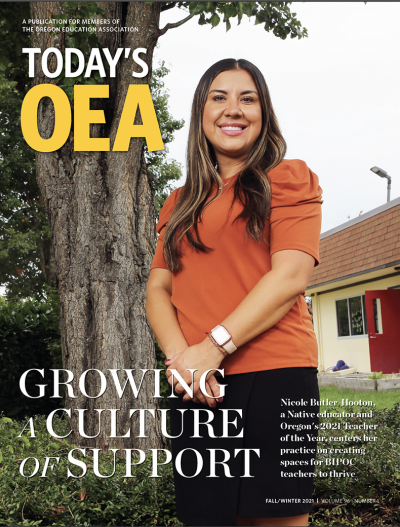Oregon’s 81st Legislative Session opens on Monday, Feb. 1, 2021 on the heels of a global pandemic, a lockdown-induced economic recession, ongoing struggles for racial justice, a punishing wildfire season, and a presidential election year unlike any other.
As always, your Government Relations team will be working to ensure that public education, from pre-school through post-secondary, emerges unscathed from a session of budget cutting and policy threats.
Going into the session, uncertainty is the watchword. Will the public and their representatives be able to meet with lawmakers face to face, or will the session be a virtual one, as several interim special sessions have been? Will the quarterly economic and revenue forecasts continue to reflect a climb out of recession, or will Oregon’s revenue picture remain grim? Will the newly elected legislature stay on the job, or will there be more walkouts like the three damaging ones in 2019 and 2020? At this writing, we cannot say, though legislative committees are trying to plan for every possibility, including another winter surge in COVID-19 cases, which could make “comprehensive distance legislating” — another type of “CDL” — all the more likely.
What we do know is that this 160-day session, spanning February 1 to July 11, will address key issues: funding, the revenue to pay for critical services, online education, meaningful equity policy, and education workforce concerns. Your team will keep you apprised of those ideas affecting you and your students as we work through the 3,000-some bills that will be introduced. And whether the state capitol in Salem opens its doors to safe access or whether your voice will come through Zoomed-in testimony and emailed letters, it is safe to say that we will need you to engage in your government’s deliberations.
OEA will be introducing several pieces of legislation to improve our public education system and the lives of our students. For instance, we will ask the legislature to double the poverty weight in the school funding formula so that districts are better able to help our students with the greatest challenges to be successful. In addition to fighting for adequate funding, we will also pursue revenue solutions to ensure that Oregon has the resources it needs to help all our people whose struggles have been exacerbated by 2020’s many challenges. And, we are again working on a suite of bills with a coalition of partners to help make our communities safer through gun violence prevention strategies.
Also on the agenda will be legislation to control class size, to address PERS, to ensure appropriate assessment for all students, and to make other educational improvements.
Virtual charter school operators will likely make a strong push to further privatize public education by raising or eliminating the 3 percent cap on student exodus from their resident districts to these for-profit operations. Your team will be working to educate legislators about the serious educational equity concerns, performance problems, and financial issues of for-profit “machine learning”. We welcome your help to outline the various reasons that vast expansion of enrollment in these outfits is a bad plan. (For more on this topic, listen to OEA President John Larson discuss online education on KOPB Radio’s “Think Out Loud” show.

